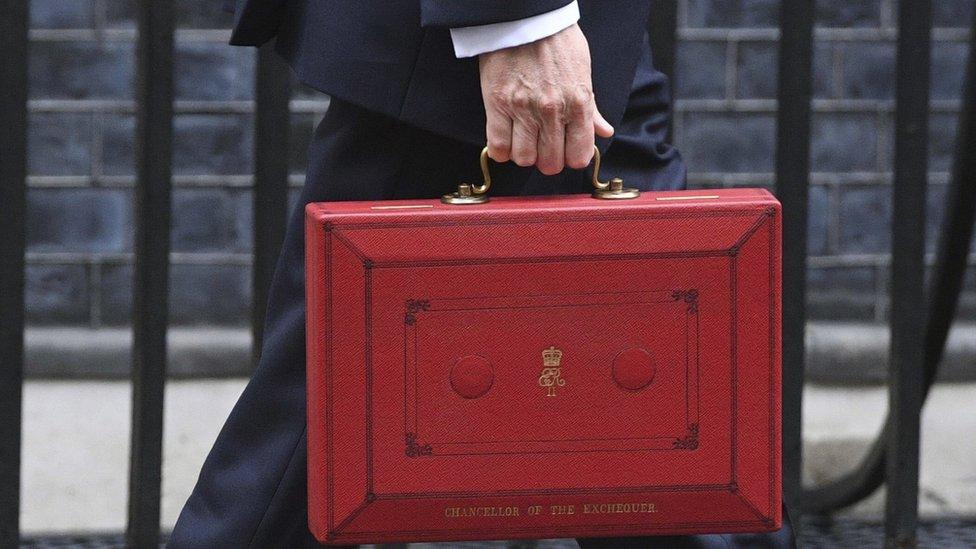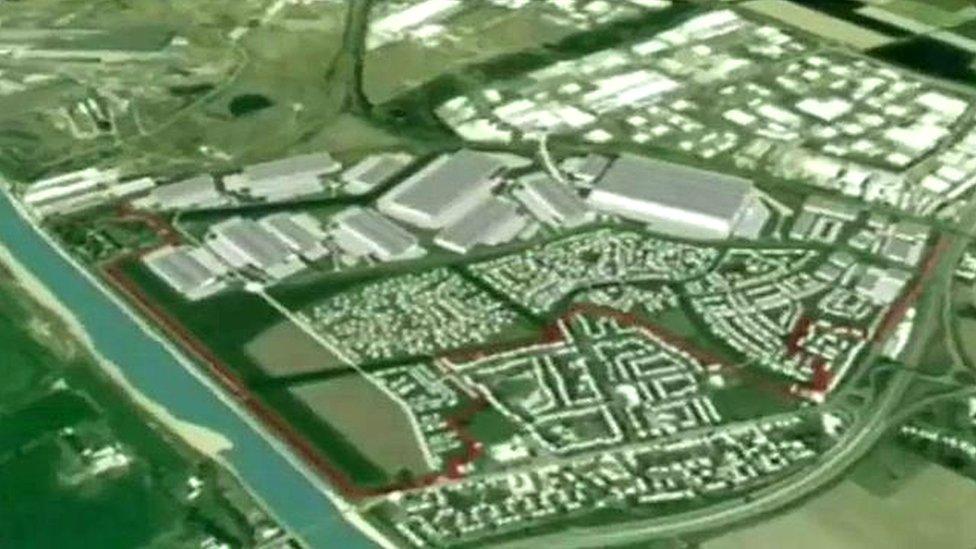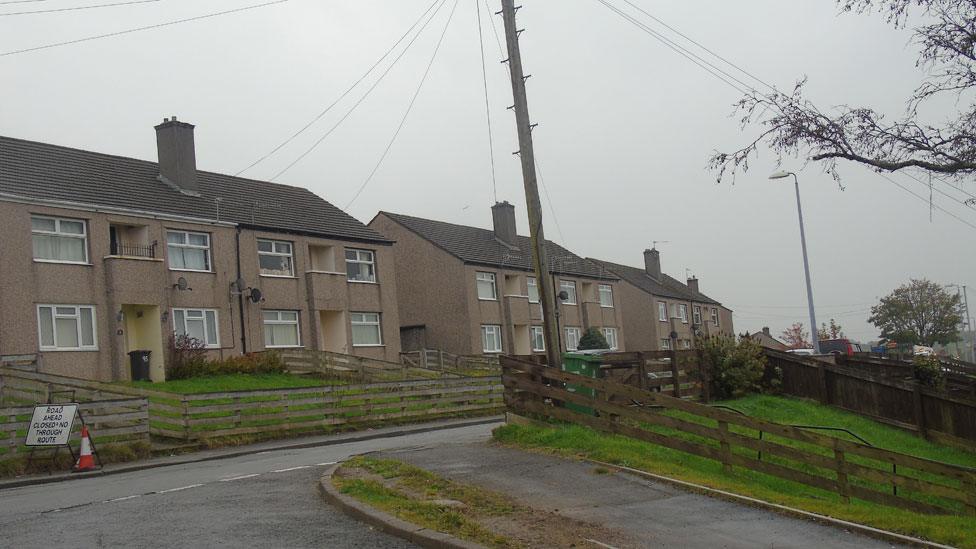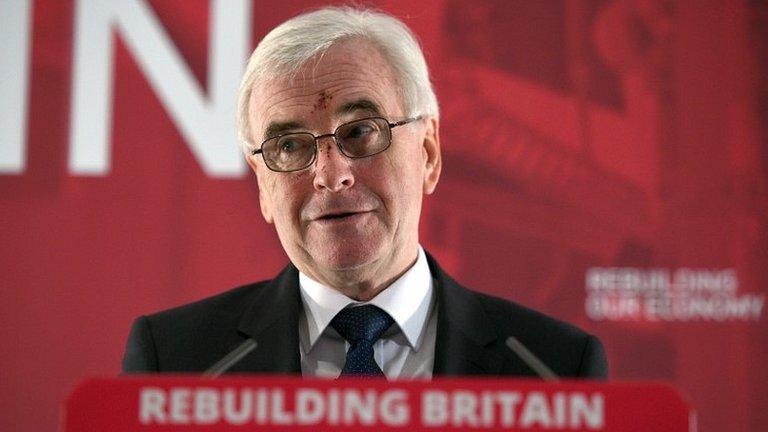Budget 2018: What could it mean for Wales?
- Published

Are there offers of help for Wales in the chancellor's case?
All eyes will be on the Chancellor's Budget on Monday for extra help to push forward major projects in Wales.
A "growth deal" in north Wales needs help to unlock £671m for infrastructure developments and to create 5,500 jobs.
There is also hope Wales could host a 5G test bed after Monmouthshire became part of a rural pilot scheme, external looking at improving technology.
And about 350,000 benefits claimants in Wales are awaiting the rollout of reforms with the new universal credit.
Here's a quick guide from BBC Wales' parliamentary and economics correspondents.
North Wales Growth Deal

Work started this month on redeveloping former RAF Sealand in Deeside into site for homes, retail and business
It is highly likely we will hear something about the North Wales Growth Deal which is aimed at creating 5,500 jobs across the region.
The Economic Ambition Board, the body that has been driving the £671m bid, says to realise that ambition, the UK government needs to produce the necessary backing in the Budget.
Half the money would come jointly from the UK and Welsh governments, with £219m from other organisations such as universities and colleges.
The growth deal would be aimed at improving what the region has to offer such as land and property, skills and transport.
On the drawing board
This video reveals the possible route of the M4 relief road
Much of the budget will inevitably focus on devolved areas, so the Welsh Government statisticians will be hard at work figuring out what the financial consequences for Wales would be of any big England-only announcement.
While we are most unlikely to see a splash-the-cash dividend for Wales, it might be worth looking out for any increase in borrowing powers for the Welsh Government.
It would be up to ministers in Cardiff Bay what they did with any extra borrowing.
At the moment the biggest project on the drawing board is the controversial M4 relief road with the metro in south Wales a close second.
Money in your pocket - Analysis BBC Wales economic correspondent by Sarah Dickens

Claimants in Pontypool were among the first to go on Universal Credit last year
This latest Budget comes just days after we learnt that wages in Wales are 2.8% below their level 10 years ago, in real terms.
According to the Wales TUC Cymru, which represents 49 unions, that means the average Welsh worker is £14 a week worse off and it comes as politicians debate whether and how the UK can say goodbye to austerity.
Budgets tend to include a mix of short-term and long-term measures.
In the short term there is unease from a wide range of organisations about the impact of the roll out of universal credit, which replaces six existing benefits.
11% of Welsh claimants already get universal credit and Community Housing Cymru, which represents housing associations in Wales, said the plan is to transfer another 350,000 claimants in Wales to universal credit between July 2019 and 2023.
The chancellor is under increased pressure to introduce changes to universal credit.
The latest, from the Commons Public Accounts Committee, backed those that argue that it is leading to increased debt, rent arrears and dependency on food banks.
5G test bed

The hype around 5G is largely driven by network equipment makers at the moment
Looking to the longer term, and in particular growing new industries, it is thought Wales may benefit from being named as a site for a 5G test bed.
It's something that Swansea has been bidding for over some time. 5g is 10 times faster than 4G and enables a range of new technologies like virtual reality and autonomous cars.
In March, Monmouthshire was one of seven areas chosen by the UK government to test 5G in rural areas, external and the hope is that one of Wales' urban areas will win more investment.
Analysis by Mark Hutchings, BBC Wales Parliamentary Correspondent
Budgets are never very showbiz but some are more flashy than others. The previous Chancellor George Osborne made a habit of pulling off the odd surprise. Often with mixed results.
Philip Hammond is much more Steady Eddie, putting the conservative into Conservatives in determining in what ends up in that famous Budget red box.
We have been told to expect a relatively "quiet" budget for Wales and all the noise around the Brexit negotiations is tending to drown out anything else.
The Institute for Fiscal Studies estimate the Hammond would need to conjure up about £20bn of extra spending to back up the prime minister's party conference insistence that the days of austerity are ending.
For all his apparently limited room for manoeuvre, Mr Hammond may feel the need to produce something shiny to justify the things-are-getting-better approach.
- Published25 October 2018

- Published19 October 2018

- Published10 August 2018
